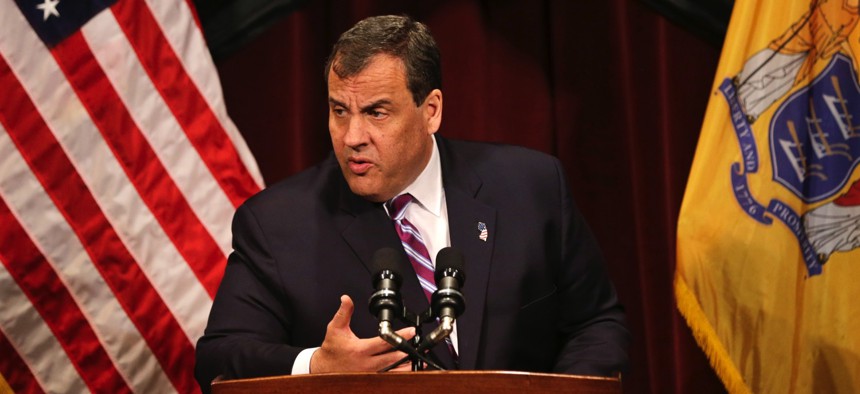New Jersey Supreme Court’s Pensions Ruling Gives Legal Victory to Christie

New Jersey Gov. Chris Christie Mel Evans / AP Photo

Connecting state and local government leaders
The 5-2 decision gives the governor a short-term win and budget flexibility. But the Garden State’s long-term fiscal outlook is dismal.
New Jersey’s state Supreme Court on Tuesday ruled in favor of Gov. Chris Christie’s administration in a complicated legal battle over pension-reform legislation he had signed in 2011 that included commitments for billions of dollars in pension contributions—contributions that he recently cut.
As The Record of Bergen County wrote following Tuesday’s 5-2 court decision:
. . . [U]nions had challenged Christie’s decision to cut a $2.25 billion pension payment in this fiscal year to $681 million, arguing that his pension reforms gave workers a contractual right to the higher payment. The U.S. Constitution generally bars states from breaking their contracts, they argued.
[Justice Jaynee] LaVecchia wrote that Christie and state lawmakers did not have the power to create that contract because of a clause in the state constitution limiting their ability to create new debts.
Unless voters approve a constitutional amendment that guarantees pension financing, Christie and state lawmakers have free rein to pay as much as they want toward the pension system during the yearly budget process, the court ruled.
What does that mean for New Jersey’s short-term and long-term fiscal outlook?
In a Moody’s statement, Baye Larsen, vice president and the lead analyst for the state of New Jersey:
The New Jersey Supreme Court has decided that pension contributions and not contractually protected. This decision has reduced the risk of sudden late-year liquidity and budget pressure, but perpetuates severe pension underfunding and rapid growth of state liabilities.
In the near term, this decision stabilizes the state’s fiscal 2015 financial position because it eases the risk of a late-year liquidity and budget shock, and preserves the state’s expected budget flexibility for fiscal 2016. However, long term, this reinforces the state’s ongoing reliance on one-time budget solutions and will perpetuate large structural imbalances and a rapidly increasing pension burden.
In April, Moody’s downgraded New Jersey’s general obligation bonds from A2 to A1, with a negative outlook.
Tuesday’s state Supreme Court ruling was a reminder of just how dismal New Jersey’s budget landscape is.
On Monday, the Volcker Alliance, a non-partisan budget watchdog group founded by former Federal Reserve Chairman Paul Volcker, released a new report focusing on the budget practices of three states: California, New Jersey and Virginia—read Bill Lucia’s Route Fifty coverage on the report’s release.
As The Wall Street Journal reported from the Volcker Alliance’s release of the report at an event in New York City on Monday:
Panelists offered their most cautionary words to New Jersey. The state hasn’t increased its rainy day fund to prevent future fiscal challenges and has delayed payments to outside parties, practices the report writers criticized . . . .
Recent budget choices by Gov. Chris Christie’s administration has exacerbated New Jersey’s problems, but proper fiscal planning in the state has eluded both parties, the alliance found.
The ruling is expected to have major impacts on the future of New Jersey’s long-term fiscal health. Short-term, Christie has to negotiate a new state budget with legislative leaders—and a June 30 deadline is looming.
"It will cost billions, billions more in a few years," State Senate President Stephen Sweeney said, according to New Jersey Advance Media. "The governor won't be the governor. I might not be the Senate president. But someone is going to be standing here holding the bag. ... where it won't be 7 percent of 10 percent of your budget, it'll be 30 percent of your budget."
Christie, who has regularly sparred with New Jersey’s public-sector unions inside and outside the courts, took a victory lap on Tuesday, noting that he was willing to find a long-term solution to the state’s fiscal mess.
“This decision is an important victory not only for our taxpayers who simply cannot afford these unsustainably high costs, but for limited, constitutional government that recognizes the proper role of the executive and legislative branches of government,” the governor said in a statement. “The Court's position is clear, as is mine, it is time to move forward and work together to find a tangible, long-term solution to make our pension system and public employee health benefit costs affordable and sustainable for generations to come. In light of today's decision, I urge all interested parties to come back to the table and partner with me to finally solve this problem once and for all.”

NEXT STORY: Volcker Alliance Aims to ‘Expose the Game’ Some States Play With Their Budgets





